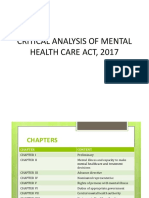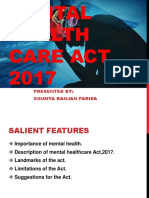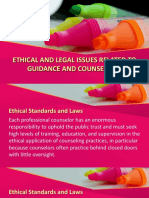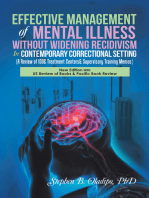Indiana Counseling Laws
Indiana Counseling Laws
Uploaded by
api-253891561Copyright:
Available Formats
Indiana Counseling Laws
Indiana Counseling Laws
Uploaded by
api-253891561Original Title
Copyright
Available Formats
Share this document
Did you find this document useful?
Is this content inappropriate?
Copyright:
Available Formats
Indiana Counseling Laws
Indiana Counseling Laws
Uploaded by
api-253891561Copyright:
Available Formats
Counseling Laws in
Indiana
Steve Rockey
CNS 780
February 18th, 2014
Licensed Counseling Practitioner Specifics
(As found in IC 25-23.6-8.5)
LMHC (Licensed Mental Health Counselor) is the way to go - the Indiana Behavioral
Health and Human Services Licensing Board handles licensing
Graduate Degree required - at least 60 hours and 1000 hours total of supervised
practice (practicum, internship, etc.) within a graduate degree
To become an LMHC, one must do 3000 hours of supervised practice - within 4 years
but no sooner than 21 months
One must take the NCMHCE (through the NBCC) to apply for LHMC certification
Licensing - Indiana doesnt license through reciprocity, done on a case by
case basis. Must have taken the NMHCE; NCC doesnt count. Must also
show that youve been counseling for at least 3 of the past 5 years and need
to pass an Indiana jurisprudence exam. Can apply for a temporary
permit to practice.
Basic Ethical Considerations
Confidentiality - Similar to NC, counselors are required to uphold confidentiality as it
is mandated by law. The exceptions to this are client danger to self, others, suspected
child abuse, and court orders (IC 16-39-2-3)
Privilege - Privilege is trickier. Privilege is held up by law (IC 25-23.6-6) but there are
various exceptions to this rule - especially with suspicion of abuse and children (is
often invoked in custody cases) (IC 31-32-11-1)
Informed Consent - again similar to NC, especially used in cases of abortion, HIV
testing, etc. (to promote a clients rights)
More Detailed Laws and Ethical Considerations
Reporting Child Abuse - Indiana has a Duty to Report law (IC 31-33-5) that requires
anyone suspecting child abuse to report immediately (orally) to DCS or local law
enforcement. If an individual is a part of a school system, institution, facility, agency,
medical facility, etc., they are required to report immediately to the individual in
charge of the institution. The leader, then, is required to make a report to DCS or local
law enforcement.
Elder Abuse - Similar to child abuse reporting laws, individuals who believe or have
reason to believe that another person is in danger are required to report. The relevant
agency to make reports to is the Adult Protective Services unit. (IC 12-10-3)
Involuntary Commitment - Indianas law on involuntary commitment is that an
individual who is mentally ill and either dangerous or gravely disabled may be
detained or committed under any of the following statutes... (IC 12-26-1-1)
This includes immediate detention, emergency detention, temporary commitment,
and regular commitment according to statute. They go in time order from least
amount of time to most.
Scope of Practice - A counselors scope of practice is found in IC 25-23.6-1-7.5,
whereas a counselors practice is described in terms of what we believe to be the
basics of counseling (items like: using research based techniques to help people
personally, socially, and vocationally; using instruments and measures responsibly;
counseling in various settings; using community resources; using individual and group
counseling; referring; and so on. This does not, however, include diagnosis.
Sources
http://www.in.gov/pla/files/IBHHSLB_2012_Edition.pdf
http://www.in.gov/legislative/ic/code
http://www.nbcc.org/Assets/StateForms/IN.pdf
http://www.theindianalawyer.com/juveniles-records-not-protected-by-counselorclient-
privilege/PARAMS/article/24997
You might also like
- Ethical and Legal Issues in Pediatric IcuDocument33 pagesEthical and Legal Issues in Pediatric IcuAnisha Mane70% (10)
- BSB Group v. GoDocument2 pagesBSB Group v. GoPeng ManiegoNo ratings yet
- Mca PresentationDocument23 pagesMca Presentationabhinandbabu314No ratings yet
- Juvenile JusticeDocument24 pagesJuvenile JusticeVartika OjhaNo ratings yet
- Juvenile Justice-1Document26 pagesJuvenile Justice-1Vartika OjhaNo ratings yet
- Social Security Disability FAQsDocument5 pagesSocial Security Disability FAQsRobertson WendtNo ratings yet
- Critical Analysis of Mental Health Care ActDocument11 pagesCritical Analysis of Mental Health Care ActDeepshikha UghadeNo ratings yet
- Inmate HandbookDocument21 pagesInmate Handbookgplese0No ratings yet
- Prevention of Sexual Harassment AT WorkplaceDocument19 pagesPrevention of Sexual Harassment AT Workplaceaarzoo dadwalNo ratings yet
- Presented By: Soumya Ranjan ParidaDocument22 pagesPresented By: Soumya Ranjan ParidaSuganthi PrabhukumarNo ratings yet
- Nursing Practice and The LawDocument19 pagesNursing Practice and The Lawapi-534059022100% (2)
- Cns 780 Assignment 3Document6 pagesCns 780 Assignment 3api-581708536No ratings yet
- Health Assessment ReviewerDocument31 pagesHealth Assessment Reviewerylee08215No ratings yet
- CHC33015 - CHCLEG001 - Assessment 2 Work Legally and EthicallyDocument7 pagesCHC33015 - CHCLEG001 - Assessment 2 Work Legally and EthicallyPallavi Bhatia100% (4)
- Mental Health Act Final (Autosaved)Document32 pagesMental Health Act Final (Autosaved)subhartipsychiatryNo ratings yet
- The Mental Capacity Act: Unit 305/HSC 036: Promote Person Centred Approaches in Health and Social CareDocument11 pagesThe Mental Capacity Act: Unit 305/HSC 036: Promote Person Centred Approaches in Health and Social CareJovana Ognenovska BakalovskaNo ratings yet
- The Sexual Harassment of Women at WorkplaceDocument14 pagesThe Sexual Harassment of Women at WorkplacerababNo ratings yet
- Committed To Healing Involuntary Commitment ProceduresDocument8 pagesCommitted To Healing Involuntary Commitment ProceduresMaria EsparzaNo ratings yet
- Markers Template 16x9Document26 pagesMarkers Template 16x9mj piersonNo ratings yet
- Survival Kit Your Rights As A Person With Mental IllnessDocument3 pagesSurvival Kit Your Rights As A Person With Mental IllnessavalongreenNo ratings yet
- Lesson 5Document48 pagesLesson 5AB ADVANCED COLLEGESNo ratings yet
- Professional Disclosure and Informed Consent Kristi MDocument3 pagesProfessional Disclosure and Informed Consent Kristi MArely AguilarNo ratings yet
- Understanding Mental Health Act V2 - Layout 1Document2 pagesUnderstanding Mental Health Act V2 - Layout 1EnaikNo ratings yet
- Understanding Mental Health Act V2 - Layout 1Document2 pagesUnderstanding Mental Health Act V2 - Layout 1EnaikNo ratings yet
- MHCBDocument27 pagesMHCBbemina jaNo ratings yet
- Have You Lost Your JobDocument28 pagesHave You Lost Your Jobeverlord123No ratings yet
- DHCS Handbook EnglishDocument33 pagesDHCS Handbook EnglishprabhaNo ratings yet
- TLA Treatment Policy Consent Form CHILD 28.07.2021Document9 pagesTLA Treatment Policy Consent Form CHILD 28.07.2021Mub ZtyleNo ratings yet
- RA 9344 As Amended by RA 10630 Juvenile JusticeDocument63 pagesRA 9344 As Amended by RA 10630 Juvenile JusticeJoan Dymphna Saniel100% (4)
- Nrs Juris Ethics School TNA Revis NY 2016Document118 pagesNrs Juris Ethics School TNA Revis NY 2016Ber Anne Jaropojop TahilNo ratings yet
- HIPAA Privacy and Security RulesDocument83 pagesHIPAA Privacy and Security RulessemarmendemxNo ratings yet
- Mental Health Nursing II NURS 2310: Unit 1 Basic Concepts of Mental Health and Mental IllnessDocument41 pagesMental Health Nursing II NURS 2310: Unit 1 Basic Concepts of Mental Health and Mental IllnessRocky Domingo LazaroNo ratings yet
- CH 09Document20 pagesCH 09api-3697326100% (1)
- Patients Rights Advocacy in California 2023Document13 pagesPatients Rights Advocacy in California 2023CARTERS TECHNOLOGYNo ratings yet
- Felony Deferred Adjudication in TexasDocument5 pagesFelony Deferred Adjudication in TexasJohn DunningNo ratings yet
- Knowthelawpaper-Reeves AsDocument7 pagesKnowthelawpaper-Reeves Asapi-367704807No ratings yet
- Job Searching & DHS DisqualificationsDocument7 pagesJob Searching & DHS DisqualificationsPPLNewsNo ratings yet
- Healthcare-Bootcamp TelemedicineDocument29 pagesHealthcare-Bootcamp TelemedicineКристина ЛучковаNo ratings yet
- Probation Officer Career: What Is A Probation Officer? - Job Description, Duties & RequirementsDocument4 pagesProbation Officer Career: What Is A Probation Officer? - Job Description, Duties & RequirementsAbdul Majeed ChannaNo ratings yet
- (RA 7610) Child AbuseDocument20 pages(RA 7610) Child AbuseNur SanaaniNo ratings yet
- Session 3 Legal Issues Related To Mental Health NursingDocument58 pagesSession 3 Legal Issues Related To Mental Health Nursingirenemwakatobe64No ratings yet
- RM MH RN 8.0 CHP 2 - AtiDocument9 pagesRM MH RN 8.0 CHP 2 - AtimicheletaNo ratings yet
- Legal Psychiatric Nursing Issues Commitment IssuesDocument17 pagesLegal Psychiatric Nursing Issues Commitment IssuesBrandon Arete100% (1)
- Prejudice and DiscriminationDocument6 pagesPrejudice and Discriminationbeal92909No ratings yet
- Louisiana SDM Screening and Response Assessment 10-17-2011Document22 pagesLouisiana SDM Screening and Response Assessment 10-17-2011Rick ThomaNo ratings yet
- Forensic PsychiatryDocument85 pagesForensic PsychiatryAnnPSWNo ratings yet
- Ethics Presentation FinalDocument12 pagesEthics Presentation Finalrah tajNo ratings yet
- Client Disclosure Statement The Well Sessions: A Listening CompanyDocument4 pagesClient Disclosure Statement The Well Sessions: A Listening Companyapi-253288987No ratings yet
- Prevention of Sexual Harassment AT WorkplaceDocument19 pagesPrevention of Sexual Harassment AT Workplaceaarzoo dadwal100% (1)
- Jurisprudence Workshop OutlineDocument9 pagesJurisprudence Workshop OutlineShawna Bowler50% (2)
- NSG Jursiprudence NotesDocument9 pagesNSG Jursiprudence NotesIah Fernandez100% (2)
- MIL HandbookDocument38 pagesMIL HandbookClaudia SilvaNo ratings yet
- Cns 780 Assignment 3 1 Know The Law 4Document9 pagesCns 780 Assignment 3 1 Know The Law 4api-709765074No ratings yet
- Psychiatric Nursing Notes: LegalDocument47 pagesPsychiatric Nursing Notes: Legalsurviving nursing school0% (1)
- Whistle-Blowing Mechanism in CGDocument18 pagesWhistle-Blowing Mechanism in CGriyasacademic100% (1)
- EthicsDocument3 pagesEthicsMarianne DalmacioNo ratings yet
- Connecticut - Probationer's HandbookDocument13 pagesConnecticut - Probationer's HandbookJ CoxNo ratings yet
- CSDL - OverviewDocument33 pagesCSDL - OverviewPeter VasseNo ratings yet
- Social Security Disability Revealed: Why it's so hard to access benefits and what you can do about itFrom EverandSocial Security Disability Revealed: Why it's so hard to access benefits and what you can do about itRating: 5 out of 5 stars5/5 (1)
- Effective Management of Mental Illness Without Widening Recidivism in Contemporary Correctional Setting: (A Review of Idoc Treatment Centers& Supervisory Training Memos)From EverandEffective Management of Mental Illness Without Widening Recidivism in Contemporary Correctional Setting: (A Review of Idoc Treatment Centers& Supervisory Training Memos)No ratings yet
- Ascanc CrosswalkDocument1 pageAscanc Crosswalkapi-253891561No ratings yet
- Rockey Theory Journals 1Document2 pagesRockey Theory Journals 1api-253891561No ratings yet
- Career Development For ElementaryDocument15 pagesCareer Development For Elementaryapi-253891561No ratings yet
- Intro Lesson - Pete The CatDocument6 pagesIntro Lesson - Pete The Catapi-253891561No ratings yet
- State of MindDocument3 pagesState of MindStefan Henry P. RodriguezNo ratings yet
- Navinchandra Nanji & Anr Vs Jivraj Bhanji On 4 September, 2017 PDFDocument13 pagesNavinchandra Nanji & Anr Vs Jivraj Bhanji On 4 September, 2017 PDFTANUNo ratings yet
- Burch v. La Petite Academy, 10th Cir. (2001)Document6 pagesBurch v. La Petite Academy, 10th Cir. (2001)Scribd Government DocsNo ratings yet
- Agapay Vs PalangDocument5 pagesAgapay Vs PalangMae SalinoNo ratings yet
- Anti Red Tape ActDocument26 pagesAnti Red Tape ActRoma Ortiz100% (1)
- Draft Counter - Affidavit 1Document3 pagesDraft Counter - Affidavit 1christie joiNo ratings yet
- ARTICLE 22 (Students Notes)Document6 pagesARTICLE 22 (Students Notes)Anonymous100% (1)
- 11 Gabucan Vs MantaDocument2 pages11 Gabucan Vs MantaPrecious RubaNo ratings yet
- RA 8042, As Amended by RA 10022Document28 pagesRA 8042, As Amended by RA 10022Camille EspeletaNo ratings yet
- York County Court Schedule May 24Document8 pagesYork County Court Schedule May 24matteyerNo ratings yet
- United States v. Djelilate, 4th Cir. (1999)Document6 pagesUnited States v. Djelilate, 4th Cir. (1999)Scribd Government DocsNo ratings yet
- Property Registration Decree and Related Laws, Justice Oswald D. AgcaoiliDocument11 pagesProperty Registration Decree and Related Laws, Justice Oswald D. AgcaoiliShenilyn MendozaNo ratings yet
- CITY OF DAGUPAN, REPRESENTED BY THE CITY MAYOR BENJAMIN S. LIM, Petitioner, v. ESTER F. MARAMBA, REPRESENTED BY HER ATTORNEY-IN-FACT JOHNNY FERRERDocument5 pagesCITY OF DAGUPAN, REPRESENTED BY THE CITY MAYOR BENJAMIN S. LIM, Petitioner, v. ESTER F. MARAMBA, REPRESENTED BY HER ATTORNEY-IN-FACT JOHNNY FERRERErikha AranetaNo ratings yet
- Childcare ResumeDocument2 pagesChildcare Resumeapi-597779676No ratings yet
- Extrajudicial With SaleDocument3 pagesExtrajudicial With SaleVan DalNo ratings yet
- Why Women Should Not Have An AbortionDocument2 pagesWhy Women Should Not Have An AbortionShyrah Marie Ouano BolanioNo ratings yet
- FPA RT Procedure For Conducting Election of Officers of The BoardDocument3 pagesFPA RT Procedure For Conducting Election of Officers of The BoardprecauteNo ratings yet
- Beja Sr. vs. CADocument11 pagesBeja Sr. vs. CAvanessa_3No ratings yet
- Jeunesse Answer / Motion To Compel ArbitrationDocument13 pagesJeunesse Answer / Motion To Compel ArbitrationThompson BurtonNo ratings yet
- Unit 2 - Lab Questions DropboxDocument3 pagesUnit 2 - Lab Questions DropboxDallas A. Hayden-GrebNo ratings yet
- Learning Unit 5 - Labour Law PART 1 FINALDocument31 pagesLearning Unit 5 - Labour Law PART 1 FINALbaneleNo ratings yet
- IntroductionDocument15 pagesIntroductionlaxmi manasa60% (5)
- Jea Claire Perez Position PaperDocument2 pagesJea Claire Perez Position PaperMohd Rashad Fatein A. RaquibNo ratings yet
- Florida Criminal Procedure OutlineDocument17 pagesFlorida Criminal Procedure Outline1tonsilsNo ratings yet
- Love Letters Modern Romance SweepstakesDocument4 pagesLove Letters Modern Romance SweepstakesdevincsmithNo ratings yet
- Conversion of Company Limited by Shares Into Company Limited by GuaranteeDocument3 pagesConversion of Company Limited by Shares Into Company Limited by Guaranteeaayush rastogiNo ratings yet
- 1 Constitutional Law 2 Notes: Actual Direct Exclusive For Charity Religions and EducationDocument19 pages1 Constitutional Law 2 Notes: Actual Direct Exclusive For Charity Religions and EducationRaven Claire MalacaNo ratings yet
- IPR Memo PDFDocument13 pagesIPR Memo PDFpravas naikNo ratings yet
- P9 Lecture Child Abuse PDFDocument53 pagesP9 Lecture Child Abuse PDFVira PebrianaNo ratings yet





























































































